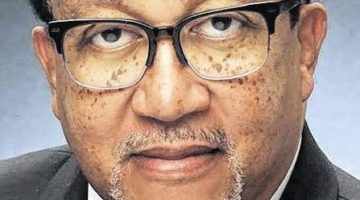An ancient Chinese curse is said to go like this: “May you live in interesting times.”
Whether a pox is afflicting all our houses or not, current events paint a grim picture of the state of the nation. For starters, the average age of Americans is 39, but the same two senior citizens are vying for the presidency as in 2020.
One of them, former President Donald Trump, is being tried on criminal charges in New York. He marketed his arraignment mug shot and raised $7 million. Dozens of his supporters flock to his trial, “making the pilgrimage to Manhattan to kiss the ring and complain to television cameras about the unfairness of the proceedings,” Politico remarked.
Trump maintains that he lost in 2020 to fraud and will not accept the results of this November’s election unless he judges it to be fair. He retweeted a social media post about heading a “unified Reich” if he wins, conjuring up Hitler leading Nazi Germany.
Meanwhile, President Joe Biden has won praise for his efforts to transform the economy and heal the troubled nation. But his continued arming of Israel and refusal to demand a ceasefire in its deadly war with Hamas led journalist Osita Nwanevu, in a Nation review of Franklin Foer’s book “The Last Politician,” to observe:
“While the press might have welcomed Biden into the White House with comparisons to Franklin Roosevelt – comparisons that Biden encouraged -he now finds himself dogged by less flattering comparisons to Lyndon Johnson, whose grand domestic policy agenda ended up being overshadowed by the blood that he allowed to be cruelly and uselessly shed in Vietnam.” Now it is the blood of Palestinians.
Trial is continuing for more than 1,000 of the insurrectionists who stormed the U.S. Capitol on Jan. 6, 2021, to stop Congress from confirming Biden’s victory in 2020. Trump calls them patriots.
The Stars and Stripes flew at Justice Samuel Alito’s home upside down -usually a sign of distress or danger – within weeks after that coup attempt. The “Appeal to Heaven” flag was flown at his vacation home; it is “embraced by some Christian nationalists who want to bring religion into American government,” The Washington Post explained. Both flags were prominent during the insurrection.
Justice Clarence Thomas was discovered to have accepted expensive gifts and other forms of patronage. He replaced the late civil rights champion Thurgood Marshall but is trying to undo his predecessor’s legacy. On May 17, he marked the 70th anniversary of the court’s unanimous ruling that ended school segregation by declaring – again – that it was a wrong decision.
The court, with its 6-3 conservative majority, abolished the 50-year-old federal right to an abortion and the 50 states are in turmoil trying to deal with the fallout.
Slavery is being downgraded in schools from human trafficking to a skills training program. Books on this and some other topics such as gay rights are being banned.
College students demonstrated against Israel’s military offensive in Gaza. Some college officials summoned armed police to remove protesters and destroy their make-shift tents, evoking memories of the antiVietnam War demonstrations 60 years ago.
The wealth race gap is worsening. For European American families, the average is $287,000, reflecting a 29 percent increase over 2019, the Federal Reserve Bank of St. Louis reported. Those families own 85 percent of total household wealth while being 66 percent of all households. The median is $45,000 for African Americans, who, overall, own just two percent of total household wealth but comprise 11 percent of all households.
And then there are diversity-equityinclusion (DEI) initiatives, the latest attempt to close the gap for African Americans. The Palm Beach Post explained D-E-I in February last year, a month after Florida’s Gov. Ron DeSantis denounced DEI and the Republicandominated Legislature passed laws reflecting his views.
“Diversity,” the Post said, is a “broad term for the many things that make people unique. That includes not only age, race, ethnicity, gender and sexual orientation but also different religions, political beliefs, languages, work experiences, incomes, education backgrounds, physical abilities and a host of other factors.”
“Equity” focuses on “ensuring that everyone has access to needed resources and acknowledging that people’s needs differ, especially if someone comes from a historically disadvantaged background. Equity is different from the term’ equality’ which means everyone is treated the same.”
“Inclusion” refers to ensuring that “differences are respected and everyone is welcome to participate” on college campuses and at workplaces.
Why, then, anyone would oppose DEI. In fact, the Post recalled, Florida’s public universities made DEI a priority about two years ago, after a policeman killed George Floyd in Minneapolis, sparking massive street demonstrations against racism.
But DEI faces sustained hostility, just as other similar efforts did, including the 40 acres and a mule program, and Reconstruction which ended up spawning the Ku Klux Klan terrorist group and Jim Crow racist laws.
Promises embodied in the Civil Rights Act of 1964 are being reversed. The Supreme Court gutted its key voting rights provision and is allowing gerrymandering of electoral districts. More recently, the court ruled that race-based affirmative action programs violate the Constitution which once deemed an African American three-fifths of a person.
With affirmative action outlawed, colleges and businesses began accelerating diversity programs started in the 1960s. But those programs are now under attack by bigots hiding their racism with the “culture warriors” label. Ironically, they invoke the Civil Rights Act of 1866 that extended to all citizens the same rights and benefits “enjoyed by white citizens.”
So far, 158 colleges and 22 states have adopted anti-DEI measures, the Chronicle of Higher Education reported. Lawmakers in 20 states have proposed 50 bills to limit DEI, the Associated Press said. But a heated debate is raging in the corporate world. During the COVID-19 epidemic and after Floyd’s murder, the Wall Street Journal reported recently, “some of the nation’s largest companies vowed to increase diversity among their corporate ranks.” That was similar to what the higher education world initially set out to do. But, under the Trump administration, the U.S. Department of Labor “challenged those hiring goals in 2020, arguing that basing hiring gargets largely on race was discriminatory.”
Some companies have bowed to pressure not only from conservatives who threaten lawsuits but also fear of a backlash from consumers being whipped into a frenzy over supposed reverse racism. The Axios news website reported that “some of the progress achieved since 2020 in providing access to opportunity — including improvements in hiring and promotion of Black employees — is at risk of being rolled back.”
CNN reported that the number of job postings on the hiring platform Indeed with DEI in the title or description have declined nearly as fast over the past year as they grew in 2021. According to the Fast Company business magazine, “Even beyond cutting jobs or trimming budgets, it’s clear that this broader cultural pushback is impacting how companies are approaching DEI.”
However, the Journal said, many companies indicate they “are not going to change anything. We are as committed as ever.” Axios also reported that business leaders “say they’re still committed to diversity” and a study by the W.K. Kellogg Foundation found that “many are doubling down.” Some, “wary of public backlash, are being quieter about their strategies.”
Optimism exists also in the Supreme Court. When the conservative majority ended affirmative action, Justice Sonia Sotomayor declared in her dissent, “Diversity is now a fundamental American value, housed in our varied and multicultural community that only continues to grow.”
And Kanji Yoshino and David Glasgow of the NYU School of Law’s Meltzer Center for Diversity Inclusion and Belonging, wrote in the Harvard Business Journal that it has come down to a question of: What will happen “when the force of the law collides with one of the deeply held beliefs of the 21st century?”
The interesting times are far from over.












No Comment